Best Eating Habits for Stronger Muscles After 50, Say Dietitians
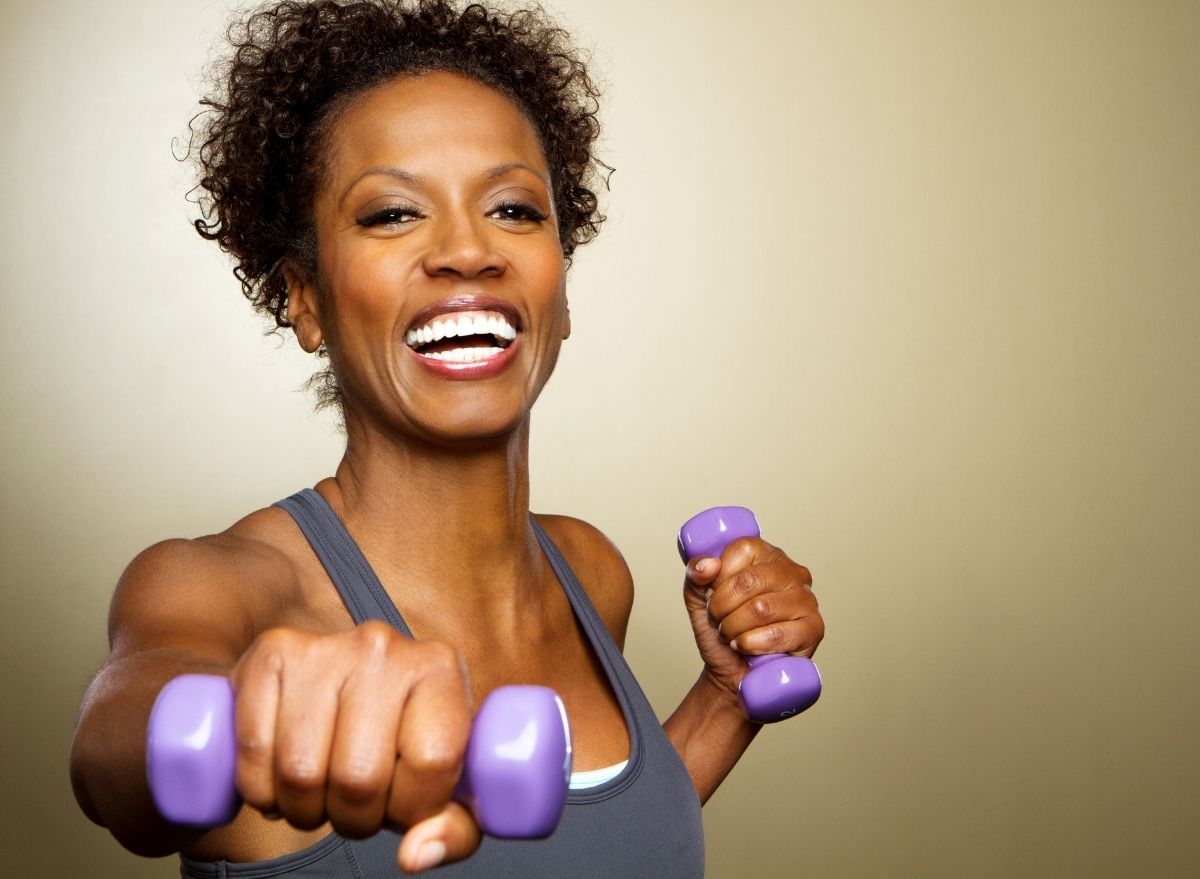
As you enter into your 50s, your body begins to undergo some changes that may affect the results you get from eating healthy and working out. For example, your muscles may naturally begin to weaken over time, which will make strength training crucial. But how can you optimize your journey to building stronger muscles in a healthy, sustainable way?
One of the changes you can make is to adopt some daily eating habits that can help your body strengthen and build muscle when you exercise. To learn more about this, we asked Amy Goodson, MS, RD, CSSD, LD author of The Sports Nutrition Playbook and member of our expert medical board, and Courtney D’Angelo, MS, RD, author at Go Wellness, for some advice.
Here’s what they had to say about eating habits that can help you build stronger muscles after 50. And for more healthy aging tips, check out The Best Foods to Eat For Heart Disease Prevention.
Consume high-quality protein at each meal and snack
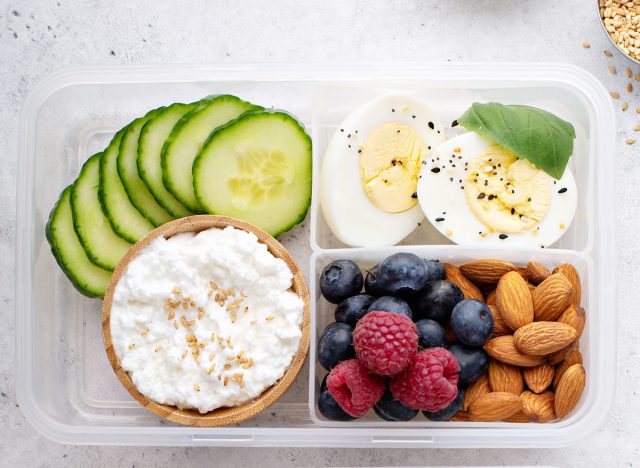
Protein is a key nutrient in building stronger muscles and pursuing better overall health, but getting enough throughout the day can be challenging.
“Protein is essential for both building and repairing lean muscle. And while lots of people think about protein at lunch and dinner, they often overlook it at breakfast and for snacks. The truth is that research supports consuming approximately 30 grams of high-quality protein at each of your three main meals and additional protein for snacks. This might look like 2 eggs, whole grain toast and 6 ounces Greek yogurt at breakfast, a salad with 3-5 ounces salmon or chicken, cheese, and veggies paired with fruit at lunch, and steak and veggie kabobs with 3-5 ounces beef and stir fry brown rice at dinner. Then adding proteins like string cheese, nuts, beef jerky, and even protein bars at snack time,” says Goodson.
Consume high-quality protein after working out
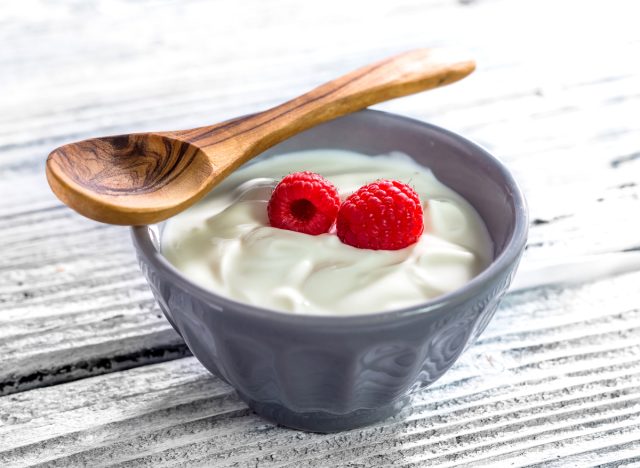
Not only is getting enough protein throughout your day important, but consuming enough of it after a workout is crucial for building muscle and seeing results.
“Exercise causes damage to muscle mass and dietary protein helps repair it to help make the muscle stronger. The goal is to eat a post-workout snack with 15-25 grams of high-quality protein (meaning that it contains all the essential amino acids) as soon as you can after a workout, but definitely within the 45 minutes following training. This helps jumpstart the muscle resynthesis process and aids in recovery as well. This might look like a smoothie made with cow’s milk, Greek yogurt and fruit, mixing 15-25 grams of protein powder in water and pairing it with a fruit or granola bar, or consuming a protein bar with the right amount of protein,” says Goodson.
Eat whole grains
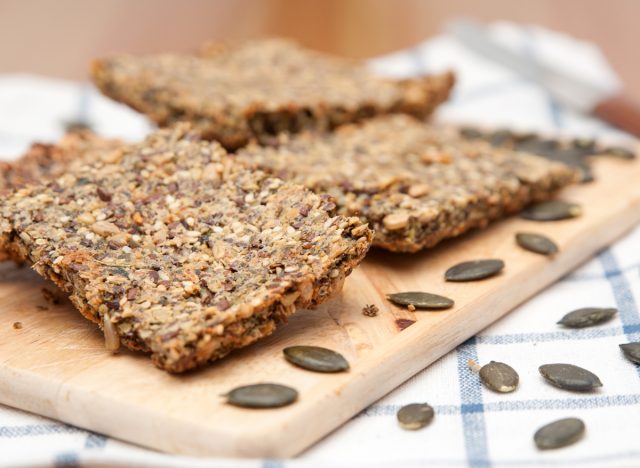
Another important eating habit you can adopt to help build more strength from a workout is to make sure you’re consuming enough whole grains, especially as a replacement for refined carbohydrates.
“One of the biggest benefits of whole grains is that they usually contain a good amount of protein. They also contain zinc, which helps build muscles, and magnesium, which can help with muscle recovery. Examples of whole grain foods include whole-wheat bread, whole-wheat pasta, oatmeal, brown rice, and buckwheat. A great morning eating habit with whole grains can be adding whey protein powder in your oatmeal,” says D’Angelo.
Add antioxidants to your eating routine
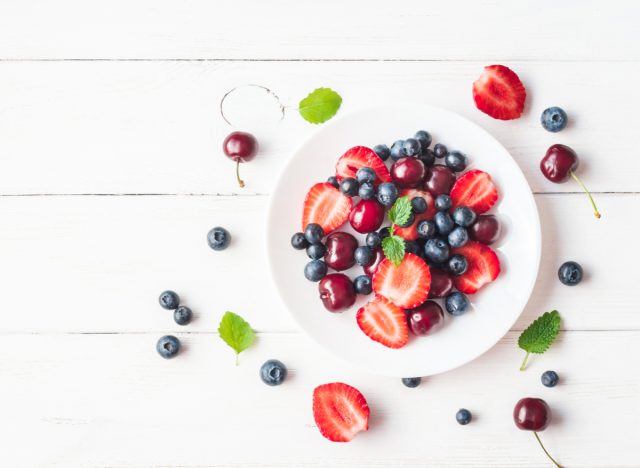
Another important part of building strong muscles is giving your body the nutrients it needs for proper recovery after a workout. Including enough antioxidants in your day can help with this.
“If you train hard, it is likely you might experience exercise-induced muscle soreness. While this can be frustrating and semi-uncomfortable, there are many recovery strategies that can help reduce muscle soreness, minimize exercise-induced muscle damage, and speed muscle recovery,” says Goodson.
She also notes, “antioxidants top the list of nutrients that can help your body recover by helping your body fight off or buffer free radicals, aka the bad guys, that cause damage to cells. Including foods and drinks like berries, orange veggies and fruit, beets, spinach, tart cherry juice, 100% pomegranate juice and more can help aid in muscle recovery to help your muscles stay strong and healthy.”